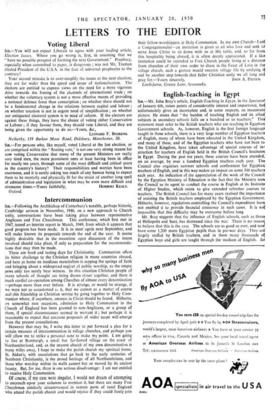Intercommunion SIR,—Following the Archbishop of Canterbury's notable, perhaps historic, Cambridge
sermon in November, 1946, on a new approach to Church unity, conversations have been taking place between representative Anglicans and Free Churchmen. This conference, which first met in 1947, issued an interim report in March, 1949, from which it appears that good progress has been made. It is to meet again next September, and will make known its proposals towards the end of the year. It seems highly desirable that in the meantime open discussion of the issues involved should take place, if only as preparation for the recommenda- tions that may then be made.
These are hard and testing days for Christianity. Communism offers its bitter challenge to the Christian religion in many countries abroad, and here at home an insidious materialism is sapping the springs of faith and bringing about a widespread neglect of public worship, as the empty pews only too surely bear witness. In this situation Christian people of many schools of thought are being drawn closer together, and there is much cordial co-operation among Churches of almost every denomination —perhaps more than ever before. It is strange, or would be strange, if we were not so accustomed tt, it, that we cannot as a matt:: of course seal this friendship in Christian service by going together to Holy Com- munion where, if anywhere, oneness in Christ should be found. Hitherto, on somewhat rare occasions, admission to Holy Communion in the Church of England has been granted to non-Anglicans, or a group of theme if special circumstances seemed to warrant it ; but perhaps it is reasonable to expect that concrete proposals of wider scope will emerge from the present consultations.
However that may be, I write this letter to put forward a plea for a certain measure of intercommunion in village churches, and perhaps you will allow me to strike a personal note to make my point. I am going to live at Bamburgh, a small but far-famed village on the coast of Northumberland, and, as the nearest church of my own denomination is many miles away, I hope to make the parish church my spiritual home. St. Aidan's, with associations that go back to the early centuries of Northern Christianity, is the proud heritage of all Northumbrians, and those who worship within its walls cannot but oe moved by its ancient beauty. But, for me, there is one serious disadvantage: I am not entitled to receive Holy Communion.
Of course, if my case were singular, I would not dream of attempting to encroach upon your, columns to mention it, but there are many Free Churchmen similarly circumstanced in remote parts of rural England who attend the parish church and would rejoice if they could freely join their fellow-worshippers at Holy Communion. In my own Church—I an a Congregationalist—an invitation is given to all who love and seek toi. serve Jesus Christ to sit down with us at His table, and, so far from this hospitality being abused, it is often deeply appreciated. if a like invitation could be extended to Free Church people living at a distance from churches of their own order to share in the Feast of Love in tho village church, such a gesture would sweeten village life by unifying and be another step towards that fuller Christian unity we all long and pray for.—Yours sincerely, JOHN A. PATTEN. Lindisfarne, Grassy Lane, Sevenoaks.


































 Previous page
Previous page